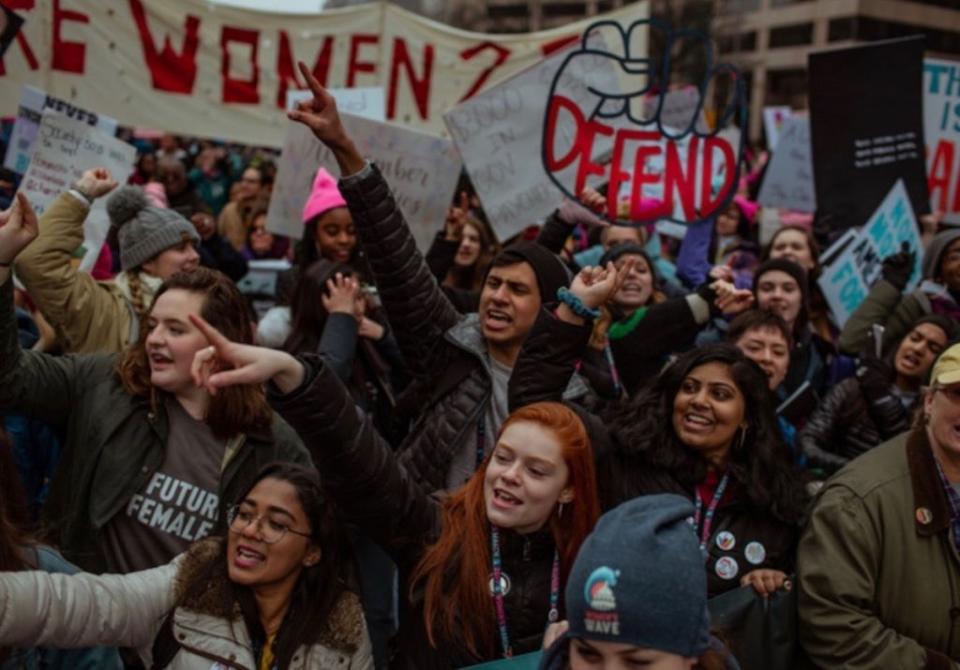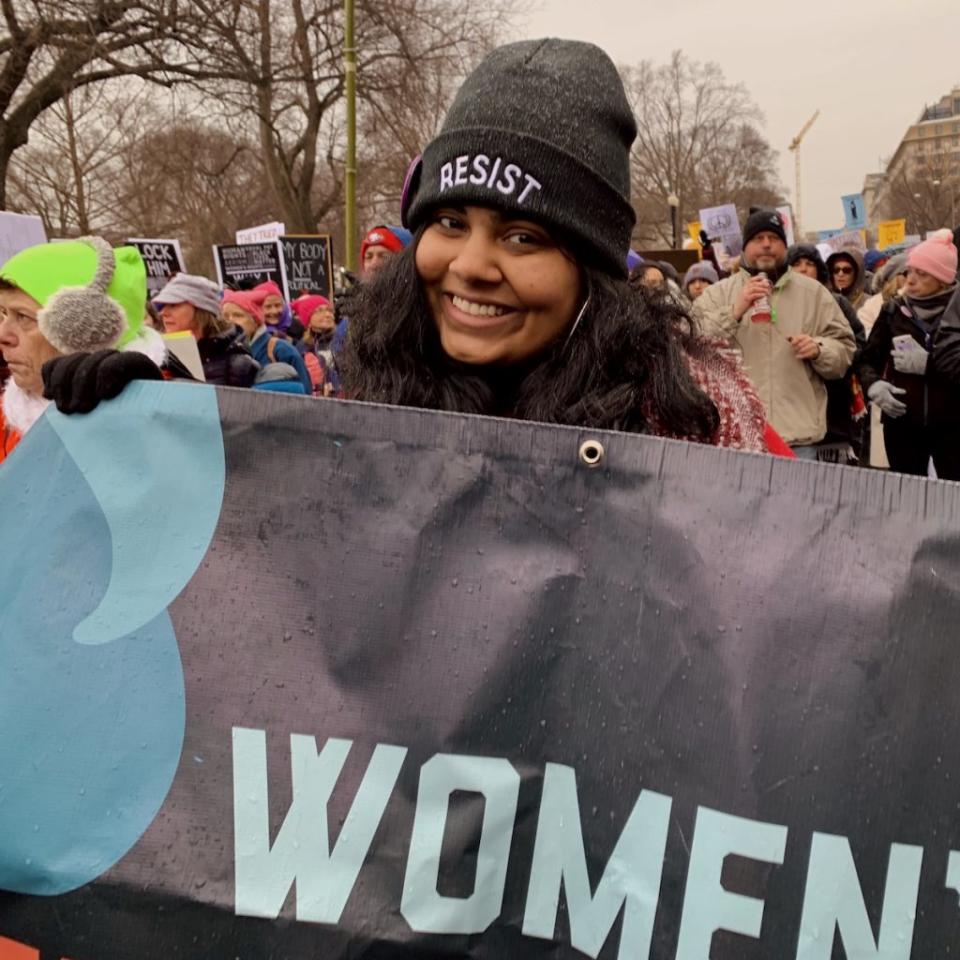Student casts light on dark issue plaguing South Asian women: 'A really difficult thing to talk about'
In just a short period of time, Anusha Chinthalapale, a 19-year-old student at George Washington University and daughter of South Indian parents, has made her presence known as an activist.
At a young age, the teenager moved from New Jersey to Germantown, Md., a community in Montgomery County she described as inclusive compared to neighboring areas.
“The majority of my childhood, I was surrounded by people who looked like me, people who sounded like me, people who talked like me because pretty much everyone was a person of color in Germantown, where I live now,” she told In The Know. “I went to schools where diversity was kind of the biggest thing that everyone was really proud of.”
But, as the older Chinthalapale got, the more she realized how unique her challenges were. Despite living in majority-minority area, for instance, she attended a high school that she bluntly called “redneck.”
“People were really into conservative government, stuff like that,” she recalled. “So they’re obviously growing up with friends who look different from me and … with the growing idea that … South Asian people are this, like they’re dirty, they’re gross, you know, they smell like this.”
Over four years, Chinthalapale dealt with many of these misperceptions as a South Asian American while “also trying to navigate the world as a woman.” Even though her parents always encouraged her to question authority and challenge societal norms, the teenager noticed, for example, that issues such as reproductive rights and feminine hygiene weren’t often talked about within her community. Much of those conversations were surface-level — Chinthalapale and her mother would have brief talks about the former’s period and menstrual cycles, but those discussions were never in-depth.

“I think that — especially around reproductive rights like sex — the whole idea of gender inequity and stuff like that for Asian immigrants is a really difficult thing to talk about,” she said. “Probably because growing up in the Eastern side of the hemisphere, those issues don’t really seem big-scale … in the grand scheme of things.”
In fact, according to UNICEF, cultural norms, combined with structural inequalities, have long disadvantaged women and girls in South Asia. Women not only have to fight back against patriarchal values (which hold sons in higher regard than daughters) — they also have to fight for access to education and other resources. As a result, many South Asian girls who become pregnant at a young age frequently enter pregnancy poorly equipped to raise their children, the organization notes.
For Chinthalapale, it was important to speak up. At times, she and her friends would trade stories about how, as South Asian American women, they lost their childhoods taking care of their brothers.
“South Asian female children are more likely to grow up quicker, mature faster and take on more responsibility as a young child, whereas South Asian males are usually protected [and] made sure they have all their affairs in order,” Chinthalapale explained. “And so that’s just kind of the toxic dynamic in the South Asian community that obviously needs to be fixed.”
The teenager said she was first inspired to take action after taking an Advanced Placement U.S. government class that had left her with more questions about the system than answers. As a junior, she joined the Montgomery County Students for Change, a grassroots organization that focus on social equity, gun violence prevention and climate reform. Working her way up to becoming the director of field operations, Chinthalapale organized demonstrations, managed petitions and lobbied for the passage of several bills.
The 19-year-old was also heavily involved in the Women’s March, which she had joined during her senior year.
“It was a lot of working with other youth organizations on a national level to kind of cultivate, I guess, a progressive reality within our generation,” said Chinthalapale, who first started as a youth regional coordinator before later becoming the co-president of Women’s March Youth Empower cohort.
In 2019, the teenager worked with her fellow leads to organize events and grow the movement’s youth membership in the DMV region. But perhaps the most pivotal moment occurred in May, when she took part in one of 400 demonstrations across the U.S. against extreme abortion bans in red states like Alabama.

“It’s always difficult having your voice heard as a woman of color,” she told Ms. Magazine that year. “I come from a community that has, for so many decades, staunchly poured more resources, time and ambitions into STEM. Because of years of subconscious stereotyping, people don’t perceive South Asians as politically inclined. But this field affects me and people like me the most.”
In the three years she’s been an activist, Chinthalapale said she’s also learned a lot about herself. As much as she has advocated for women’s reproductive rights and other issues, she has also worked to break down what she calls her own “internalized [version] of societal norms.”
“It’s definitely difficult to come to terms with the fact that like, hey, maybe you haven’t been as anti-racist as you thought or maybe you haven’t been as anti-mysogynistic as you thought,” she said. “Maybe it’s time for you to take a second and really focus on what needs to be fixed and how you can fix it.”
Now a junior at George Washington, Chinthalapale said her experience in campaigning for reproductive rights has prepared her to have uncomfortable conversations about hot-button issues, especially at a university where the student body is predominately white and may not necessarily share the same views as her. Currently an intern for Senator Chris Van Hollen of Maryland, she hopes to be a constitutional lawyer and an educator someday.
“Something that my South Asian upbringing taught me was that people can steal your money, they can steal your house, your car, your whatever, but they cannot steal an ounce of knowledge that you have,” she said.
Give your home office a much-needed upgrade with these must-haves:
In The Know is now available on Apple News — follow us here!
If you found this story insightful, you might want to read about Dimple Patel, who is on a mission to raise awareness about mental health within the South Asian community.
More from In The Know:
After a driver cursed a woman out at a drive-thru, she responded in a “powerful” way
These inexpensive silky-soft pillowcases on Amazon are good for your hair and your skin
The 3 most affordable meal delivery kits for cooking at home
Shoppers say this cordless vacuum is much cheaper and just as powerful as the Dyson
The post Anusha Chinthalapale is raising visibility for South Asians while fighting for reproductive rights appeared first on In The Know.

